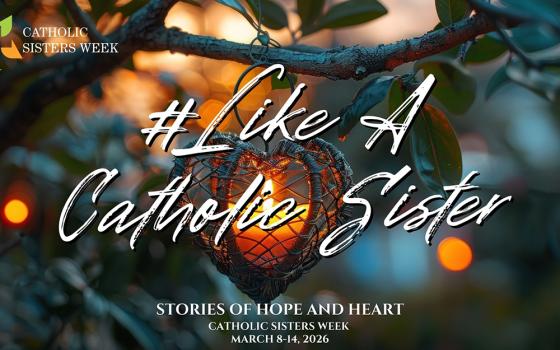
(Unsplash / Nathan McBride)
Let's be honest. You wake up on any particular morning of late — maybe it's Monday, or Tuesday, or Wednesday, or some other day — and suddenly it feels like every other day. Anyone who has seen the movie "Groundhog Day" might be forgiven for having a bit of déjà vu when opening their eyes in the morning. More than one person I know has admitted to waking up thinking maybe it was all a bad dream. But no. This is real.
We are living through pandemic times.
Who among us has thought upon waking, or at any other time of day for that matter, that this is a propitious time?
Given that I had to actually look up the meaning of the word — used recently by Pope Francis in a meditation he wrote for the Spanish publication Vida Neuva — not me. Propitious, I have learned, means something favorable or indicating a good chance of success.
Francis believes that this strange moment in history we are each living through is a "propitious time," a time to be open to the Holy Spirit who can "inspire us with a new imagination of what is possible" and lead us to "make new things."
Wow. What shifts within me, within you, when you think of this as a favorable time?
Framing this moment as favorable or propitious by no means negates the true human suffering spanning the globe. Instead, it invites us to embrace this moment as one poised for some desperately needed transformation — transformation of you, of me, of us.
"We cannot allow ourselves to write the present and future history by turning our backs on the suffering of so many people," wrote Francis. Rather, "an emergency like COVID-19 is overcome in the first place by the antibodies of solidarity."
Again, what shifts within me, within you, when you think of this pandemic time this way?
Do I have to put on a mask when I grocery shop to protect myself from dangerous others? Or can I see the inconvenience of wearing a face covering as an act of true solidarity for the common good, one that places a preferential option on the vulnerable and those essential store workers putting themselves at risk to feed the nation.
What if this shared global experience of solidarity and prioritizing the vulnerable and the common good helps us to also develop what Francis terms the "necessary antibodies" of justice and charity?
Advertisement
We know we will not be the same after this pandemic. How wonderful would it be if, at the other end, we were on our way to being more caring for our neighbor, more committed to the future, more responsible, more understanding and more focused on the common good? Everyone may not be transformed this way, but imagine the impact if just some people had their priorities reoriented toward the arc of justice through this experience.
I join Francis in his pondering: "If we act as one people, also in the face of the other epidemics that are hitting us, then we can have a real impact" in other areas — like global hunger and poverty, war and violence, and environmental destruction.
Before the pandemic, I had recently discovered the work of Monica Sharma, a physician and epidemiologist from India with a long career at the United Nations. In her book, Radical Transformational Leadership: Strategic Action for Change Agents, Sharma paints a picture of the stance we need to take in transformational moments like this one. It is a picture I have not been able to get out of my mind and heart, and it resonates even more strongly during these pandemic times — open arms.
This work is about emergence — unpredictable, but with direction. Emergence as we engage in transforming our global and local community with open arms embracing a paradigm shift — one arm is steady in who we are BEING, what we stand for, our universal values; the other arm opens to making the changes in the world, the world we dream about and want to live in. These two bookends of our emergence — who we are BEING and the results we deliver — are foundational and always present. We need both — an orientation toward results as well as the inner knowing and confidence in what we stand for — to manifest our greatness, and to challenge the false dichotomy between being and doing.
The coronavirus emergency has stopped us all in our tracks. Many people are finding it difficult to do anything productive, given the stress and stressors of the present moment. Millions have lost the jobs they need to feed their families. Frontline workers and essential workers, on the other hand, are busier than ever and stretched to the limit, taking risks for the common good.
The coronavirus emergency is unpredictable. We are still learning about the virus itself, and the economic impact appears to be greater than anything since the Great Depression.
Something will emerge through the emergency. We will be different.
The heart-provoking words of Francis and Sharma are percolating in my pandemic ponderings. How we approach this moment carries tremendous import, for future and present generations.
Do we close our arms (and borders), take a defensive stance and deny our interconnected reality? Or might we open our arms and hearts and take this opportunity to develop antibodies of justice, charity and solidarity that will transform our own hearts and, if we are daring enough, even the world?
[Susan Rose Francois is a member of the Congregation Leadership Team for the Sisters of St. Joseph of Peace. She was a Bernardin scholar at Catholic Theological Union and has ministered as a justice educator and advocate. Read more of her work on her blog, At the Corner of Susan and St. Joseph.]






